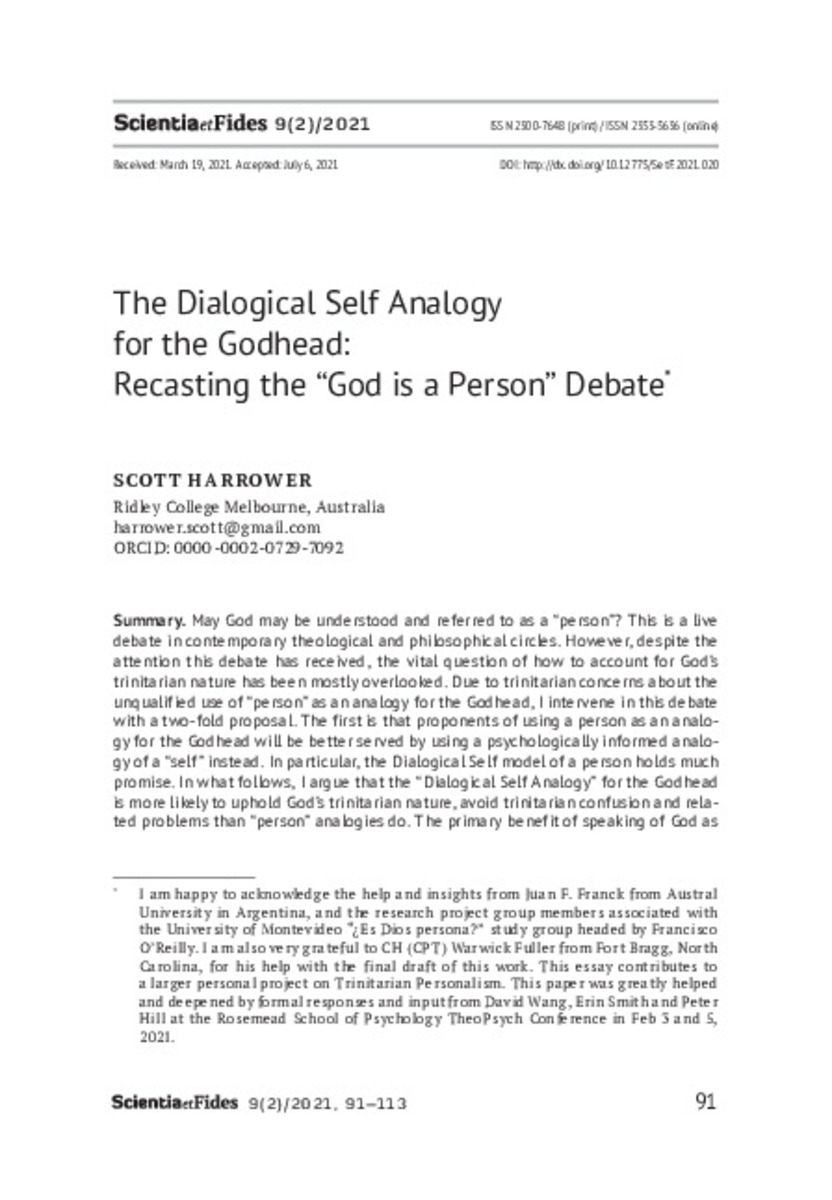Registro completo de metadatos
| Campo DC | Valor | Lengua/Idioma |
|---|---|---|
| dc.creator | Harrower, S. (Scott) | - |
| dc.date.accessioned | 2021-11-15T12:51:02Z | - |
| dc.date.available | 2021-11-15T12:51:02Z | - |
| dc.date.issued | 2021 | - |
| dc.identifier.citation | Harrower, S. (Scott). "The Dialogical Self Analogy for the Godhead: Recasting the “God is aPerson” Debate". Scientia et Fides. 9 (2), 2021, 91 - 113 | es |
| dc.identifier.issn | 2300-7648 | - |
| dc.identifier.uri | https://hdl.handle.net/10171/62565 | - |
| dc.description.abstract | May God may be understood and referred to as a“person”? This is alive debate in contemporary theological and philosophical circles. However, despite the attention this debate has received, the vital question of how to account for God’s trinitarian nature has been mostly overlooked. Due to trinitarian concerns about the unqualified use of “person” as an analogy for the Godhead, Iintervene in this debate with atwofold proposal. The first is that proponents of using aperson as an analogy for the Godhead will be better served by using apsychologically informed analogy of a“self” instead. In particular, the Dialogical Self model of aperson holds much promise. In what follows, Iargue that the “Dialogical Self Analogy” for the Godhead is more likely to uphold God’s trinitarian nature, avoid trinitarian confusion and related problems than “person” analogies do. The primary benefit of speaking of God as aDialogical Self is that it offers apsychologically modelled analogy for God, whilst avoiding the language of person, yet strongly taking into account God’s trinitarian nature. This has the important benefit of preserving the concept and language of “person” for the trinitarian persons (the prosopa/hypostases), and hence avoiding the linguistic, conceptual and ecumenical confusion that arises when referring to the Godhead as aperson. The strength of using the model and language of aDialogical Self as an analogy for the Godhead (instead of person) is demonstrated by showing its compatibility with Erickson’s criteria for describing the Trinity. | es_ES |
| dc.language.iso | eng | es_ES |
| dc.publisher | Uniwersytet Mikołaja Kopernika | es_ES |
| dc.rights | info:eu-repo/semantics/openAccess | es_ES |
| dc.subject | Trinity | es_ES |
| dc.subject | Person | es_ES |
| dc.subject | Personalism | es_ES |
| dc.subject | Dialogical Self Theory | es_ES |
| dc.subject | Dialogical | es_ES |
| dc.subject | Analogy | es_ES |
| dc.subject | God | es_ES |
| dc.title | The Dialogical Self Analogy for the Godhead: Recasting the “God is aPerson” Debate | es_ES |
| dc.type | info:eu-repo/semantics/article | es_ES |
| dc.identifier.doi | http://dx.doi.org/10.12775/SetF.2021.020 | - |
| dadun.citation.endingPage | 113 | es_ES |
| dadun.citation.number | 2 | es_ES |
| dadun.citation.publicationName | Scientia et Fides | es_ES |
| dadun.citation.startingPage | 91 | es_ES |
| dadun.citation.volume | 9 | es_ES |
Ficheros en este ítem:
Estadísticas e impacto
Los ítems de Dadun están protegidos por copyright, con todos los derechos reservados, a menos que se indique lo contrario.






